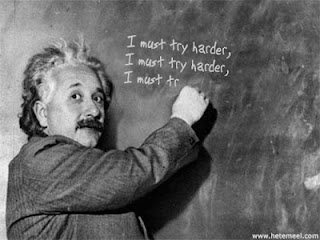I’m
a total sucker for time travel stories, with their wild narrative possibilities
that allow for glimpses of the future, or to meddle with the past, producing
paradoxes that can bend your mind. Charles Yu’s tale about a time machine
repairman, a meta-man called Charles Yu, promised just the kind of time
brain-bending thrill I needed. But a curious thing happened – I didn’t connect
with the book at all and found the plot to be pedestrian compared to other
great time travel related novels, such as Dan Simmons’ Hyperion (1990) and Greg Bear’s
Eon
(1991).
How
to Live Safely in A Science Fictional Universe’s protagonist is a bit of a loser
who has escaped his problems by hiding out in his time machine with a pet dog
who doesn’t really exist and a computer with a female persona called Tammy.
Unfortunately most of the narrative is centered around Yu’s family, most
notably his father who toils for years to create the world’s first time machine
by working on the theory that human psychology is the key to time travel. Yu
goes on to get himself in a spot of bother with a time paradox and has to work
out a way around it. What could be intriguing stuff is unfortunately let down
by the subdued loser tone and Yu’s endless ruminations about his relationship
with his parents. Charles Yu, the protagonist, not the author, is not an
engaging character and the novel also suffers from sluggish forward momentum.
I
could go on to further criticize the book’s shortcomings, but instead I’ll talk
about how being dissatisfied with this novel made me think about the nature of
writing and criticism. This is Charles Yu’s debut novel and as someone who is
trying to write fiction I know that it’s no mean feat to sit down and put in
the hours to actually write a decent story. Yu undoubtedly put a great deal of
hard work into this novel and Corvus also believed that it was good enough to
be published. But then someone like me reads it and finds it wanting. Every
reader is a critic, whether they write about it or not, but how can we be sure
of our critical acumen? With any work of art there exists an objective criteria
that can act as a critical roadmap for judging its worth. In the case of
literature it is not enough to merely state that the book did not engage or
that you simply didn’t like it, you need to be sure objectively as to why the
book falls short; that your criticisms are not wholly given over to the
subjective whims of your tastes. This is why a book like Joyce’s Ulysses (1922) is considered
the greatest novel ever written despite the fact most people do not actually
enjoy reading it (I’ve met a few who have, but not many).
I
am actually comfortable with my conclusion that How to Live Safely in A
Science Fictional Universe is flawed due to objective reasons rather than subjective
distaste. But there is still a nagging doubt, enough to stop me from giving it
a rating. Looking around on the net I found that reader’s reactions ranged from
one star reviews right up to five star reviews with raves about the novel’s
originality. Did I miss the point of the novel entirely? Was the narrative so
clever that all I could notice was some trivial shortcomings that are perhaps
commonplace in an author’s debut novel? Did I miss key clues that could have
led to an understanding of a complex hidden subplot? This has also made me
rethink the plot and wonder if the book is a clever analogy for an individual’s
journey through life and therefore space/time? A journey filled with regrets
and what ifs that define our psychological landscape.
Perhaps,
Charles Yu, I should read your novel again. Perhaps this is the very point of
the novel, after all the eponymous protagonist is stuck in a time loop, reading
a book that came from the future, a book that Yu is actually writing as he is
reading it. A book called How to Live Safely in A Science Fictional Universe. Confused? So am I.
Read the book yourself and let me know what you think.


I'm with you, Jeremy, this book failed to engage me on an emotional level. I don't think you missed anything - I think the book was missing something and I doubt very much that a re-read would yield anything that would change your mind. Still, don't let me talk you out of it...
ReplyDeleteHere's my review: http://www.goodreads.com/review/show/347387275
Hi Annabel. I read your review and agree with what you had to say. The fact that time travel novels can be complex makes me wonder if there is more to this book than I thought, but perhaps not. I would check out any further novels by Yu - he is promising.
DeleteI heard you are coming to Subiaco Library for a talk?
Yes, next week. Will you be there during the talk? Please come and say hi it would be nice to meet face-to-face.
ReplyDeleteI'm planning to be there. Should be good! Don't be nervous about the Subiaco crowds - they are mellow.
Delete